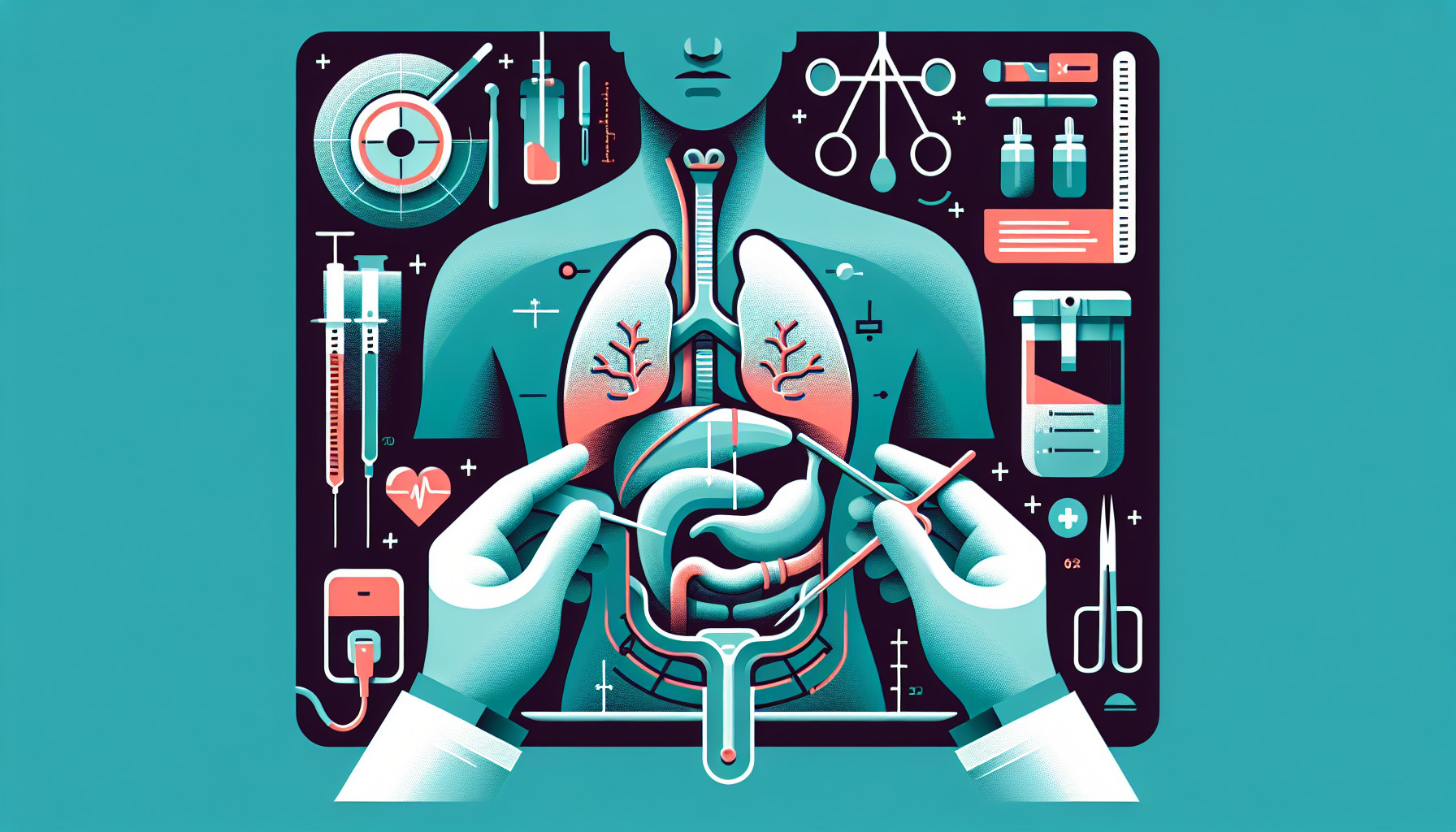Our Summary
This research paper compares two types of organ transplant procedures for diabetic patients: simultaneous pancreas-kidney transplant (SPK) and simultaneous deceased donor pancreas and living donor kidney transplant (SPLK). The researchers studied the outcomes of patients who had either procedure. They found that the survival rate of the pancreas graft was lower and the rate of acute rejection was higher in the SPLK group. However, there was no significant difference in the survival rate of the kidney graft, the rate of kidney rejection, and the mortality rate between the two groups. This suggests that SPLK could be a potential alternative to SPK, although the higher rates of pancreas rejection and failure need to be addressed.
FAQs
- What are the two types of organ transplant procedures for diabetic patients studied in the research?
- How do the survival rates of the pancreas graft and the rate of acute rejection differ between the SPK and SPLK groups?
- Are there any significant differences in the survival rate of the kidney graft, the rate of kidney rejection, and the mortality rate between the SPK and SPLK groups?
Doctor’s Tip
One helpful tip a doctor might tell a patient about pancreas transplant is to carefully follow the prescribed medication regimen to prevent rejection of the new organ. It is important to take immunosuppressive medications as directed to help the body accept the transplanted pancreas and reduce the risk of complications. Regular follow-up appointments with healthcare providers are also crucial to monitor the function of the transplanted pancreas and adjust treatment as needed. Additionally, maintaining a healthy lifestyle with a balanced diet and regular exercise can help support the success of the transplant.
Suitable For
Patients who are typically recommended for a pancreas transplant are those with type 1 diabetes who have end-stage renal disease and are undergoing or have undergone kidney transplantation. These patients may have complications such as hypoglycemic unawareness, frequent severe hypoglycemia episodes, or poor glycemic control despite optimal medical management. Additionally, patients with type 1 diabetes who have significant glycemic variability, frequent diabetic ketoacidosis episodes, or complications such as gastroparesis, neuropathy, or retinopathy may also be considered for a pancreas transplant.
Other patients who may be recommended for a pancreas transplant include those with type 1 diabetes who have had a kidney transplant in the past and are experiencing complications related to their diabetes, such as recurrent diabetic nephropathy or declining kidney function. Patients with type 1 diabetes who are at high risk for developing complications such as cardiovascular disease, stroke, or peripheral vascular disease may also be considered for a pancreas transplant.
In general, patients who are recommended for a pancreas transplant are those who have significant health complications related to their diabetes that cannot be adequately managed with medical treatment alone. These patients may benefit from a pancreas transplant to improve their glycemic control, reduce their risk of complications, and improve their overall quality of life.
Timeline
Before pancreas transplant:
- Patient is diagnosed with type 1 diabetes and develops end-stage renal disease (ESRD) requiring dialysis
- Patient undergoes evaluation for transplant candidacy, including medical, psychological, and financial assessments
- Patient is placed on the transplant waiting list and waits for a suitable donor organ to become available
- Patient receives a call notifying them that a donor pancreas and possibly a kidney are available for transplant
- Patient undergoes pre-transplant testing and evaluation to ensure they are healthy enough for surgery
After pancreas transplant:
- Patient undergoes surgery to receive the new pancreas and possibly a kidney
- Patient is monitored closely in the hospital for any complications, such as infection or rejection
- Patient starts taking immunosuppressant medications to prevent rejection of the transplanted organs
- Patient undergoes regular follow-up appointments with their transplant team to monitor their progress and adjust medications as needed
- Patient gradually resumes normal activities and experiences improved blood sugar control and kidney function
- Patient may experience complications such as rejection, infection, or side effects from medications, which require ongoing management
- Patient continues to be monitored for the rest of their life to ensure the transplanted organs are functioning properly and to address any potential issues that may arise
What to Ask Your Doctor
- What are the potential risks and complications associated with a pancreas transplant?
- How long is the recovery process after a pancreas transplant?
- What are the success rates of pancreas transplants in terms of graft survival and overall health outcomes?
- How will a pancreas transplant impact my diabetes management and overall quality of life?
- Are there any specific lifestyle changes or medications I will need to adhere to post-transplant?
- How often will I need to follow-up with my transplant team for monitoring and care?
- What are the eligibility criteria for a pancreas transplant and how do I know if I am a suitable candidate?
- How does the simultaneous deceased donor pancreas and living donor kidney transplant (SPLK) procedure differ from the traditional simultaneous pancreas-kidney transplant (SPK) procedure?
- What are the potential benefits and drawbacks of opting for a SPLK procedure over a SPK procedure?
- Are there any long-term considerations or potential complications associated with a pancreas transplant that I should be aware of?
Reference
Authors: Kim JM, Ko Y, Choi M, Kwon HE, Lee JJ, Jung JH, Kwon H, Kim YH, Shin S. Journal: Sci Rep. 2023 Jan 2;13(1):49. doi: 10.1038/s41598-022-27203-w. PMID: 36593273
